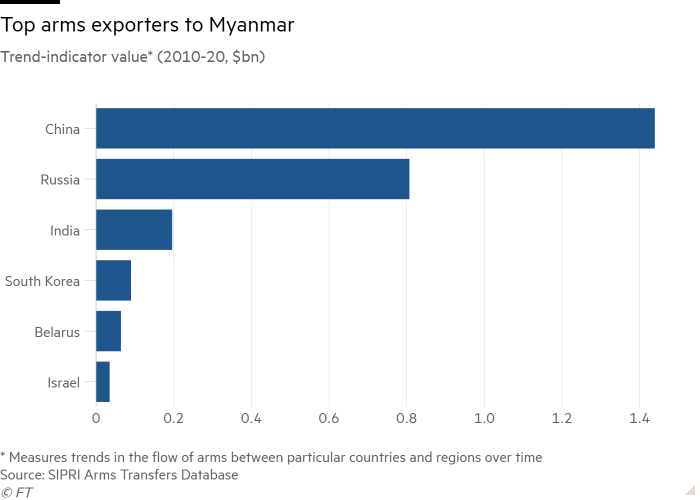[ad_1]
Myanmar’s military junta marked Armed Forces Day last week in the capital Naypyidaw with a parade featuring tanks, missiles and a flyover of military aircraft, including Russian-made MiG-29 combat jets.
Seven Asian countries sent low-profile delegations to the event hosted by coup leader General Min Aung Hlaing last week. But the highest-ranking official to attend was from further afield: Alexander Fomin, Russia’s deputy defence minister.
Russia is striding into a diplomatic void left by the world’s other leading powers, as they deliberate whether — and to what extent — to engage with the junta that on February 1 seized power from Aung San Suu Kyi’s democratically elected government. Moscow’s attitude has echoes of its 2015 decision to lend military support to President Bashar al-Assad’s pariah regime in Syria, helping turn the tide of the civil war in the dictator’s favour.
“In terms of appearance, yes, it’s a big middle finger to the west: ‘We can do what we want’,†said Alexander Gabuev, chair of the Russia in the Asia-Pacific Program at the Carnegie Moscow Center, of the decision to send a top official to Naypyidaw.Â
As Min Aung Hlaing surveyed his troops last weekend, an estimated 169 people were killed by the regime, including at least 14 children, a nurse and a Mandalay snack vendor who was shot and burnt alive by troops, according to local media.
The conflict has shown signs of broadening into an international one in recent days. Refugees escaping air strikes in an area of eastern Myanmar controlled by an ethnic Karen militia army have fled into Thailand. Three other minority armed groups said they planned to join what they called the “spring revolution†being fought in Myanmar’s cities if the military did not stop its killing, according to Reuters.

“Myanmar could easily become a failed state within a matter of months, with violent urban unrest, a fast escalation of ethnic-based armed conflicts, and a widespread humanitarian emergency,†said Thant Myint-U, a historian and author. “The economy is in freefall, imperilling the lives and livelihoods of tens of millions of people.â€Â
Russia’s decision to deal openly with a government most of the world has shunned was opportunistic, driven largely by the prospect of increased arms sales, analysts said. But Moscow also has less to lose from the worsening civil conflict than Myanmar’s Asian neighbours.
“Myanmar is not on Russia’s doorstep, so they don’t have to worry about the fallout, and don’t have to deal with the refugee crisis,†said Hervé Lemahieu, director of the Power and Diplomacy Program at the Lowy Institute, an Australian think-tank.Â
Russia’s ties with Myanmar date to the country’s former military regime and continued during the decade of democracy. Moscow has courted closer political and economic ties with Asian countries since being targeted by western sanctions after its 2014 annexation of Crimea.
Fomin also has longstanding relationships with Myanmar officials thanks to his former job as head of the defence ministry’s military-technical co-operation department. He helped to sell some of the Russian hardware displayed in the armed forces parade.
Russia is Myanmar’s second-largest supplier of weaponry after China, according to the Stockholm International Peace Research Institute, a think-tank. Myanmar’s military is awaiting delivery of six Sukhoi Su-30 advanced fighter jets ordered in 2019, and the two sides signed contracts for a Russian air defence system and a suite of tactical surveillance drones in January, according to the Centre for Analysis of Strategies and Technologies, a Moscow-based defence think-tank.Â

“They see an opening here to increase their market share at the expense of China and others,†Gabuev said. “Even if there is a democratic government in the future, the more you sell now, the more you lock the armed forces into training programmes and additional sales.â€Â
Moscow’s gambit in Myanmar also underscored the disarray and mixed messages emanating from the wider international community after the coup.Â
The US has been most blunt in denouncing the junta’s seizure of power, imposing sanctions on top military officials and their businesses. Washington also froze a trade deal with Myanmar this week. Japan, Myanmar’s biggest aid donor, suspended new development assistance in what its foreign minister called a “clear positionâ€.Â
However, India and China, Myanmar’s big neighbours, have been more reserved in their public remarks and sent representatives to the military parade.Â
Beijing, which had good relations with Aung San Suu Kyi’s government, has been particularly guarded in its public stance after anti-Chinese sentiment erupted among anti-coup protesters.
Beijing’s most forceful remarks came last month when the foreign ministry voiced concern about “the safety of Chinese institutions and personnel†after some garment factories in Yangon were set alight.Â
The junta will have to seek business partners in Russia and elsewhere as more sanctions are imposed, investors withdraw and credit lines dry up. “We are waiting for your businessmen,†Min Aung Hlaing told the editor of Moskovsky Komsomolets, a Moscow-based newspaper, who was part of the Russian delegation.Â
Moscow, in turn, has made an early bet on what it believes is the likelier winning side, said analysts.Â
“Russia is gambling that the army will prevail,†said Thant Myint-U. “It’s a low-risk gamble as Russia has little to lose if Myanmar descends into civil war, but if the army holds on to power Moscow will have a new friend on the Indian Ocean.â€
[ad_2]
Source link





